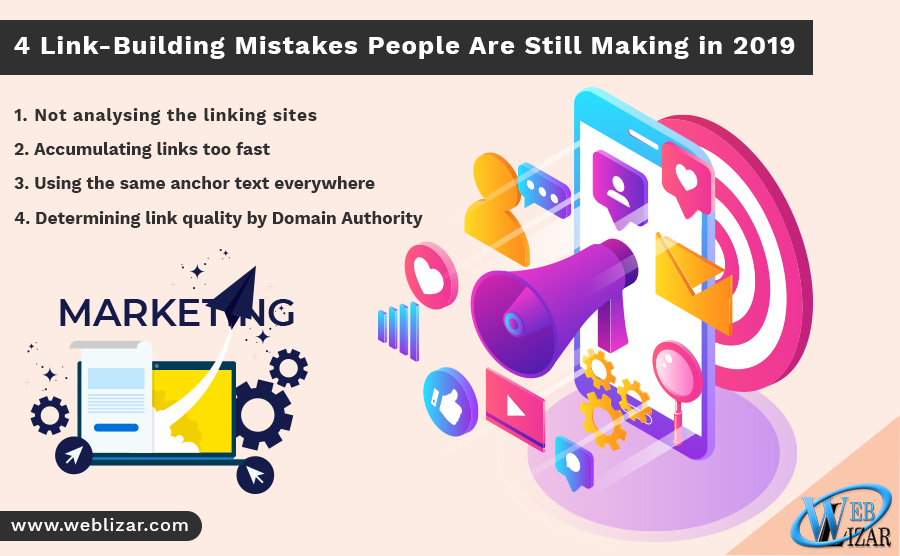Given the popularity of link building as an SEO strategy, it’s no wonder that so many new webmasters focus on accumulating backlinks right from the start. While there’s nothing wrong with that, this approach exposes them to some common mistakes associated with link building. Be it for lack of technical know-how, the rush or general misunderstanding of what they should be doing, eventually, this initial effort is undeniably wasted.
SEO experts understand that off-page SEO, which is the primary reason for link building, is about quality backlinks. This is a process that requires time and patience. Their great experience allows them to take time to develop a strategy and avoid the mistakes that beginners make.
If you are going to play in the same field as the experienced webmasters, you want to leave no room for such mistakes. You have to play as they do. Without further delay, let’s look at some of the most common mistakes made by link builders and how to avoid them.
1. Not analyzing the linking sites
One of the biggest mistakes SEO managers make is to build links without the long term effects in mind. The links you accumulate will continue to have an effect on your website as long as they are live. And this effect can be positive or negative depending on a number of factors. You want to pursue links that will have a positive impact today and in the future.
What does that look like? First, a high-quality link must be relevant. The content on the link must be in context with the content on the linking page. Otherwise, you’re not helping the consumer or yourself. Such a sub-par link could even attract a manual penalty from Google. Second, the link should come from a reputable site. Getting a link from a trusted website is a strong indicator to search engines that your content is both credible and relevant.
Link relevance and page authority are both attributes of the linking site. Therefore, you want to make sure that all the backlinks you get are both relevant and come from authoritative sources. To help determine this, SEO experts use available tools to monitor and analyze backlinks and analyze the websites linking back to their content. This not only helps them understand the relevance and authority of each but also know when they get a new link, recover lost links, disavow bad links, track their rankings and reverse engineer their competitors’ backlink strategies.
2. Accumulating links too fast
Generating backlinks isn’t easy. Established websites have to constantly create quality content and supplement that with other link building strategies and still it takes time. It takes even longer when your site is new with a few products and pieces of content. This is why you might have come across someone on the internet claiming to sell backlinks. Because who wants to go all the way when there’s a shortcut?
Be warned, however, that seeming too fast and furious is an equally great way to get your website flagged, diminishing your position on the search results. This is because a massive accumulation of backlinks within a short time is indicative of fraudulent practices. It doesn’t matter that your links are relevant.
So how many backlinks should you gather per day, per week or per month to stay within the threshold? Unfortunately, neither Google nor the many SEO experts on the internet have given a definitive answer to that. It’s up to you to know when you’ve gone too far too fast. A tip to always remember is that search engines want to see a natural flow. If they suspect you’re using unscrupulous means to rank higher, you will be penalized.
3. Using the same anchor text everywhere
Writing guest posts is one of the quickest ways to get backlinks from the websites you want. Additionally, it allows you to write the content in the quality you prefer and engage with a wider audience. It’s like an extension to your own website or blog.
Through the anchor text, you’re able to link back to your own content. Search engines use the anchor text as a reflection of how other people view your content. If many sites think your page is relevant for a particular set of keywords, you can rank well for those terms.
However, because the search engine assumes it’s the original site’s owner writing the content, some diversity in the anchor text is naturally expected if many sites are linking to a particular piece of content. Therefore, many sites linking to the same page using the same exact words is spammy behavior. While you don’t have control over the anchor text used by others when linking to your content, diversify whenever you can.
4. Determining link quality by Domain Authority
Some SEO managers gauge the quality of a link solely based on the Domain Authority (DA) of the linking site. The DA is merely a comparison of websites against a scale set by tools that have no affiliation to Google or any other search engine. Therefore, link quality cannot be based upon this metric.
To be clear, site authority does affect SEO. Search engines view authority as a reflection of your credibility. However, they haven’t been clear about how they determine this authority. Certain signals such as a number of links pointing to your website and their quality have been known to indicate authority. Also, if many users are visiting your site, search engines may take this as a sign of user trust in your content.
Final word
SEO managers end up spending too much time making and fixing mistakes. Granted, there’s something to be learned from every mistake. However, you don’t need to go through it if it’s already been made by countless other people before you. Better to learn from them. The four items on this list are the same blunders that have plagued SEO campaigns for years. To avoid them, you have to acknowledge them.

